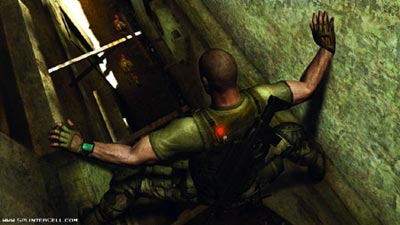Stealth... Or Trial & Error?

It's a glorious start to another glorious week here at PMB. Nothing like some sunshine to take the sting off the innate shitty-ness that is a Monday morning...
What did you all play over the weekend? My games du jour were Castlevania: SOTN (yes, I'm finally warming up to it) and last week's bargain highlight, Splinter Cell: Double Agent.
SCDA is a stealth-shooter game and one tough mofo. It represents a slight departure in the prolific Splinter Cell series, improving in some ways but also staying rigidly true to the series formula... much to their detriment, I should add. It got me thinking about the qualities that make a great stealth game. SCDA captures some of these things and really drops the ball on the others. Read on for my psuedo-intellectual spiel...
It's been a few years since I played the original Splinter Cell and even longer since I experienced the masters of modern "sneakers", Thief (1 & 2). As different in tone and style as the Thief games are from Splinter Cell, I couldn't help but feel that Ubisoft, with now 4 games into their SC franchise, has NOT played enough Thief. They need to seriously study that game to learn what a true stealth action game is all about.
My #1 complaint with the original Splinter Cell was that it was too linear and forced players to "solve" the missions like a puzzle, instead of as a dynamic, espionage situation. You had to go one way, do a certain sequence of things and do it within a certain amount of time. None of that is bad in of itself, but Splinter Cell made you feel like you were being forced down a magic solution-path and did not reward creative approaches to mission objectives. Roughly 4 years later, I'd expected the SC developers to have brought in some "next-gen" game mechanics for Double Agent for the 360. Let's just say I was very disappointed.
Let's forget for a moment the few new wrinkles that have been added to SCDA. Spying for both the NSA and the terrorists is a very cool idea, as you need to balance your objectives and retain enough trust from both factions. What isn't cool with the game so far are the smaller levels and an even stricter adherence to linearity than ever before. It sometimes feels like a classic adventure game making the awkward transition into the stealth genre, what with the inclusion of mini-games for everything (lockpicking, safe-cracking, hacking...even pulling a goddamn parachute string) and the very contained nature of the maps. The game has been feeling like a string of "stealth vignettes". I'm following that "one right path" again and after progressing through each locked door, I'm presented with yet another puzzle that needs to be solved in a prescribed manner before I can move on. One wrong move, and half your secondary objectives could be blown. The missions become a grind of trial & error, saving and reloading.
Granted, the game is still fun and compelling to play. The artificial challenge makes me want to complete the missions almost in spite. This is simply the wrong way to make a stealth game. The more I play Double Agent the more I realize how well Looking Glass Studios nailed (and defined) the stealth genre back in 1998 with their Thief games. Those classics rewarded exploration, good reconnaissance, timely and skillful use of your tools and allowed you to approach you objectives from various angles. You can give Sam Fisher all the do-hickeys and fancy moves you like: he still can't touch Garrett in terms of pure elegance and efficiency.
The Splinter Cell games are still top quality despite all of my complaints. The graphics are excellent, the moves are cool and it really does make me feel like a super spy. The series just needs to evolve and utilize better AI and level design, or it could easily devolve into a thinly disguised puzzle-adventure game rather than the nail-biting stealth thriller it was meant to be.
Labels: commentary, splinter cell


0 Comments:
Post a Comment
<< Home